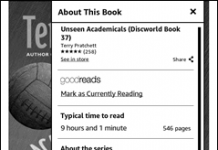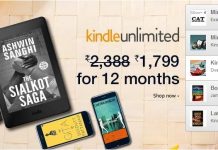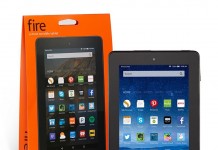 This is a brilliant essay in the Guardian and I think all hardware reviewers should take note of it. Naughton discusses how people are making an “… an elementary schoolboy mistake, namely the assumption that, in a networked world, it is the hardware that matters most. According to this view, because the iPad, viewed purely as a device, was seen as incomparably superior to the Kindle, it followed that Apple would triumph in the ebooks market.”
This is a brilliant essay in the Guardian and I think all hardware reviewers should take note of it. Naughton discusses how people are making an “… an elementary schoolboy mistake, namely the assumption that, in a networked world, it is the hardware that matters most. According to this view, because the iPad, viewed purely as a device, was seen as incomparably superior to the Kindle, it followed that Apple would triumph in the ebooks market.”
He then goes on to say:
In the end, however, it’s not hardware that matters, but the effectiveness of the overall system in which the device is embedded. That was the great lesson of the Apple iPod: although the hardware was lovely from the outset, it would never have had the impact it had without the link to iTunes software on the PC/Mac and thence to the iTunes store. Other companies had made nice MP3 players, but none had put together a seamless system for getting music from CDs or online retailers on to them. Apple did and the rest is history.
You really should read the whole thing. In this regard, I don’t generally toot my own horn, but here are a couple of excerpts from an article I wrote in August of 2008 about Sony and Amazon. It’s entitled Amazon is right – Sony is wrong – Digital Editions sucks:
I like things simple as well. This hit me like a fish in the face when I installed Fictionwise’s eReader on my iPhone. Want a book – go to Fictionwise on the phone and download one. It hit me again, more like a whale in the face, when a I told a colleague about a free ebook being offered by Amazon. He has a Kindle and, while I watched he fired it up and downloaded the book while standing outside in the sunshine. No computer, no USB cable, no card reader, no Sony software, no Adobe software, no Calibre software, no conversion programs, no WiFi router. He bought a book without a computer – while standing outside in the sunshine. Get it?
He did something remarkable. He wanted a book and he bought it (albeit for free). What’s that like? It’s like going to a bookstore. Wow! NOW we are having fun.
As much as I dislike DRM and all the associated crap, what I have a profound respect for is that extremely difficult thing to attain – a painless consumer experience. Apple has achieved this with iTunes and Amazon is achieving it with the Kindle.
People are always commenting to me on my Sony Reader. I am now working directly in the consumer space and I’m amazed at how many people are attracted to the machine and would like one for themselves. When they ask me what they should do – the answer is clear: get a Kindle. The consumer wants, and rightfully so, things to be simple, easy and not to require technical expertise. The Kindle encompasses all of this. One stop shopping. Hey, buying an ebook is just the same as buying a box of cereal. The fact that you may not be able to finish the cereal because someone padlocks the box is another question. That’s the question we focus too often on here. Let’s get the cereal into the kitchen first.
Thanks to Frank Sleightholme for the link

































I fail to see what’s so “brilliant” about the article. It states the obvious truth – that it’s the content delivery system behind the device that is the most important determinant of it’s success, but then goes on to claim the Kindle is better than the iPad as an ebook reader based almost entirely on device hardware features (e.g. It’s screen is better for reading in bright sunlight, it’s lighter and cheaper) rather than anything to do with the delivery system.
The fact is that it’s just as easy to buy an ebook from iBooks store on an iPad as from Amazon on a Kindle, Amazon has no advantage there. Where it does have an advantage is in the sheer volume of titles available for purchase, which is hardly surprising given that Amazon is the world’s largest bookstore, has been selling ebooks and readers for years vs a few months for Apple. Amazon has a clear advantage in mindshare for potential ebook purchasers, at the moment. It will be interesting to see what the situation is in 2-3 years time. If the publishers want retail competition in ebooks and allow Apple to carry a similar number of titles to Amazon at competitive prices then things will look different, but if they are happy for Amazon to continue to have a virtual monopoly on ebooks then they won’t.
The article also failed to acknowledge that the future of ebooks may well not lie with simple text-on-a-screen ebooks that we have now but whole new multimedia “app books” that do much more than just echo the print world. “Elements” on the iPad may be more like the ebook future than the latest John Grisham on the Kindle. In that case the greater hardware flexibility of true tablet computers like the iPad will give them an advantage.
Paris, the Prince of ancient Troy, was commanded by Zeus to give a golden apple to the most beautiful of three goddesses. (Zeus, a shrewd womanizer, fearing the consequences of this perilous decision, delegated it quickly.) Paris’s choice led to all kinds of trouble, and to the Trojan War.
Regarding devices that read ebooks: I like them all. I would not want to be forced to choose between the love-goddess Aphrodite (Apple’s iPad), the war-goddess Athena (Amazon’s Kindle) or the marriage-goddess Hera (B&N Nook).
To the question: “Which device gives us access to the most ebooks?” the answer — surprisingly, and by a great margin — is Apple’s iPad. The iPad can access all the ebooks in Apple’s iBooks store, plus all the ebooks in the Amazon store (using the Kindle App), plus all the ebooks from the Barnes & Noble store (the Nook app), plus all the ebooks from the Borders store (Kobo app for iPad), plus all the world’s unencrypted EPUB ebooks, plus all the multimedia ebooks and textbooks that are now being developed specifically for the iPad.
These are three good ereaders; with any of these you won’t go wrong. But stepping back to look at the three ecosystems, I would say that for the variety and the versatility, right now Apple has the edge.
Two excellent commentaries on this article. My only contribution is to say that this is now, tomorrow is another day. Amazon has it’s neck out front. Apple is over priced but has the hardware and the system GUI. Let’s see how it pans out toward Xmas and in 2011. My guess is there will be major shifts in the whole eBook market and by the end of 2011 it may look very different.